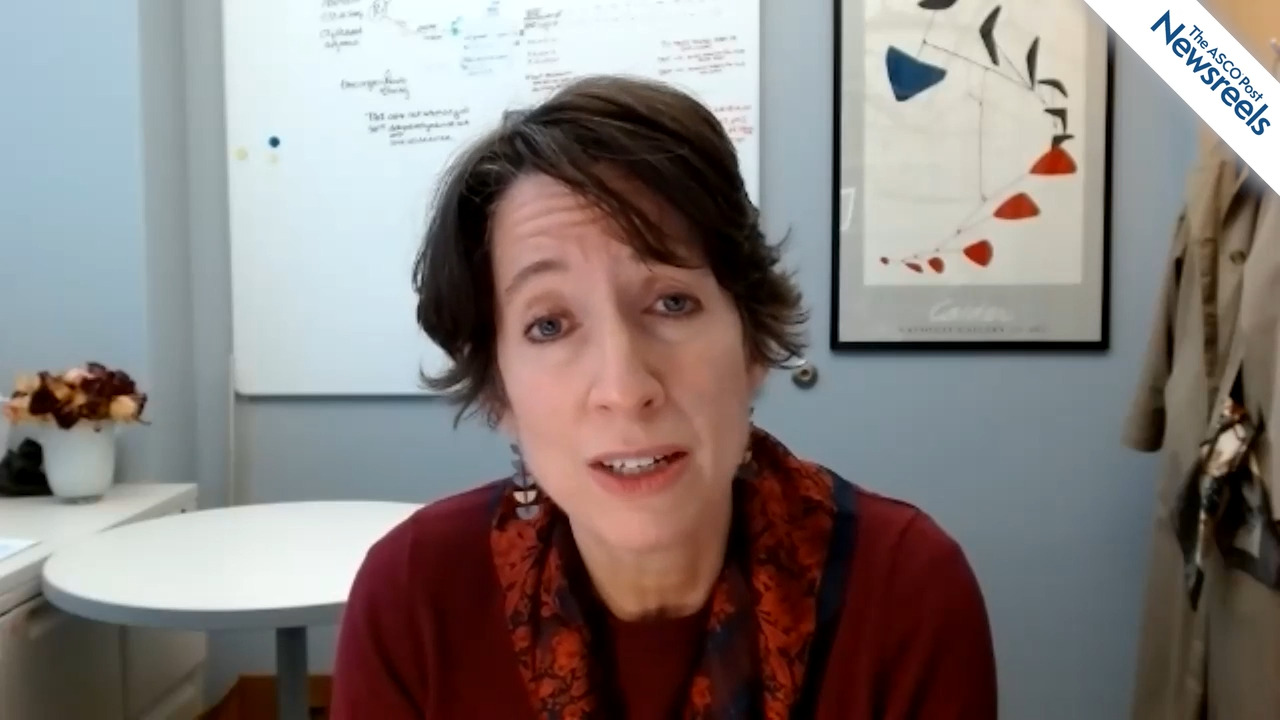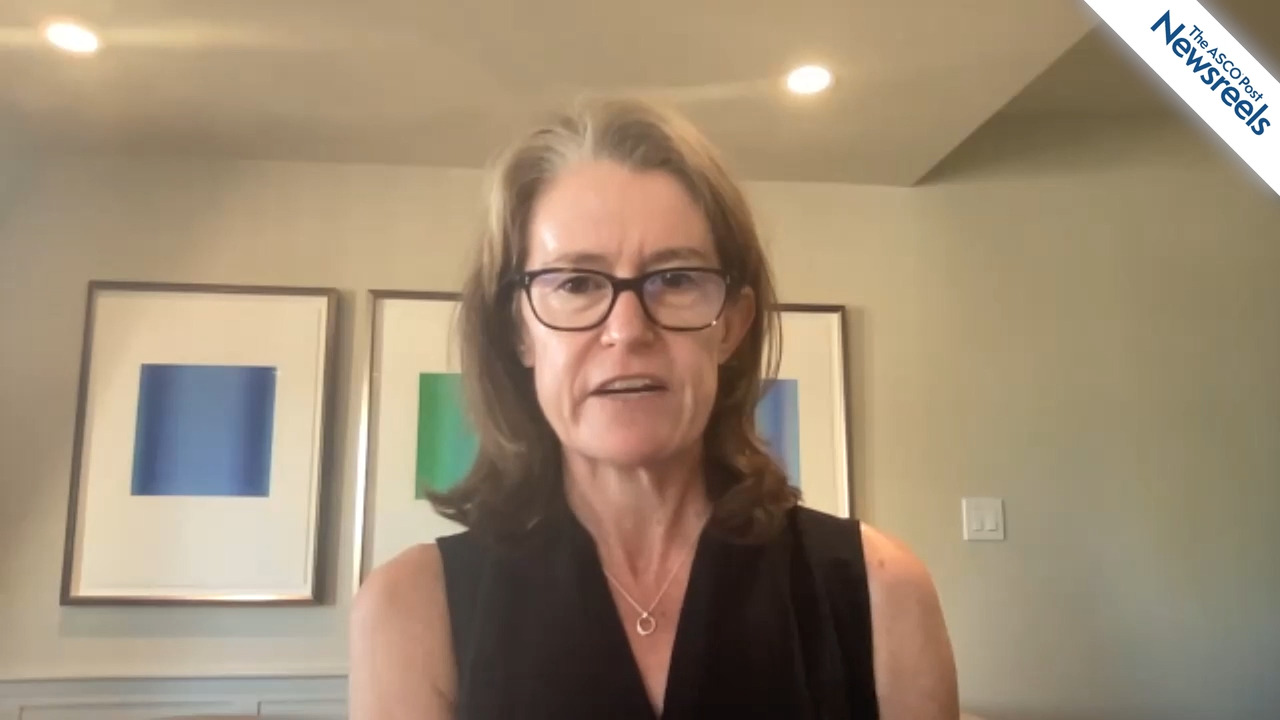2021 San Antonio Breast Cancer Symposium
David Cescon, MD, PhD, Comments on the MONALEESA Analyses
David Cescon, MD, PhD, Clinician Scientist at the Princess Margaret Cancer Centre in Toronto, Canada, was the invited discussant of the two MONALEESA analyses.1,2 He noted that the most recent overall...
MONALEESA Analyses Show Widespread Benefit for Ribociclib in Hormone Receptor–Positive, HER2-Negative Breast Cancer
Further analyses of the MONALEESA metastatic breast cancer trials have shown that the benefit of ribociclib plus endocrine therapy in the first-line setting extends to most intrinsic molecular subtyp...
Expert Point of View: Debu Tripathy, MD, and Hope S. Rugo, MD, FASCO
The ASCO Post asked Debu Tripathy, MD, Professor and Chair of Medical Breast Oncology at The University of Texas MD Anderson Cancer Center, Houston, and Hope S. Rugo, MD, FASCO, Professor of Medicine,...
Datopotamab Deruxtecan Shows Activity in Advanced Triple-Negative Breast Cancer
Datopotamab deruxtecan, an antibody-drug conjugate directed against trophoblast cell surface antigen-2 (Trop-2), is showing promise as a treatment for relapsed or refractory advanced triple-negative b...
PADA-1 Trial: With Early Identification of ESR1 Mutation, Switch to Fulvestrant in Metastatic Breast Cancer
Switching from an aromatase inhibitor to fulvestrant upon early identification of the ESR1 mutation in plasma—before disease progression—doubled progression-free survival in the phase III PADA-1 trial...
Expert Point of View: Angela DeMichele, MD, MSCE
Angela DeMichele, MD, MSCE, the Alan and Jill Miller Professor in Breast Cancer Excellence at the Perelman School of Medicine of the University of Pennsylvania in Philadelphia, commented on NIMBUS1 fo...
Dual Checkpoint Inhibitor Therapy Elicits Responses in Highly Mutated Breast Cancer
Patients with advanced HER2-negative metastatic breast cancer and high tumor mutational burden achieved responses—often durable—from treatment with the immunotherapy doublet of nivolumab and ipilimuma...
EMERALD Trial: Oral Selective Estrogen Receptor Degrader as Second- or Third-Line Therapy for Advanced Breast Cancer
Use of the first investigational oral selective estrogen receptor degrader (SERD) elacestrant significantly reduced the risk of death or disease progression and lengthened progression-free survival co...
T-DXd Shows Activity in HER2-Low, HER2-Undetectable Breast Cancer
The antibody-drug conjugate fam-trastuzumab deruxtecan-nxki (T-DXd) has led to practice changes in previously treated HER2-positive metastatic breast cancer. Most notably, in the DESTINY-Breast03 tria...
Clinical Trials Underway for T-DXd in Breast Cancer
The current standard of care for the neoadjuvant treatment of HER2-positive early-stage breast cancer consists of trastuzumab plus pertuzumab and polychemotherapy. But some patients, particularly thos...
PADA-1 Trial: With Early Identification of ESR1 Mutation, Switch to Fulvestrant in Metastatic Breast Cancer
Switching from an aromatase inhibitor to fulvestrant upon early identification of the ESR1 mutation in plasma—before disease progression—doubled progression-free survival in the phase III PADA-1 trial...
EMERALD Trial: Oral Selective Estrogen Receptor Degrader as Second- or Third-Line Therapy for Advanced Breast Cancer
Use of the first investigational oral selective estrogen receptor degrader (SERD) elacestrant significantly reduced the risk of death or disease progression and lengthened progression-free survival co...
Metformin Added to Standard Adjuvant Chemotherapy Fails to Improve Outcomes in Early Breast Cancer
The addition of metformin, a drug commonly used to treat type 2 diabetes, to standard adjuvant treatment failed to improve invasive disease–free survival or overall survival for hormone receptor–posit...
Final Analysis of PALLAS Trial: No Benefit of Adjuvant Palbociclib Plus Endocrine Therapy in Early Breast Cancer
The final protocol-defined analysis of the phase III PALLAS trial confirmed the negative results of the second interim analysis, showing no benefit of palbociclib plus endocrine therapy in the adjuvan...
Evidence Supports Ovarian Function Suppression Plus Aromatase Inhibitor in Premenopausal Women With Early Breast Cancer
The benefits of ovarian function suppression were sustained long term for premenopausal women with hormone receptor–positive breast cancer, according to updates from SOFT and TEXT, two randomized, con...
MONALEESA Analyses Show Widespread Benefit for Ribociclib in Hormone Receptor–Positive, HER2-Negative Breast Cancer
Further analyses of the MONALEESA metastatic breast cancer trials have shown that the benefit of ribociclib plus endocrine therapy in the first-line setting extends to most intrinsic molecular subtype...
RxPONDER Update Explores Benefit of Chemotherapy in Subgroups
Updated results of the SWOG S1007 RxPONDER trial confirmed the key takeaway from the previous analysis: adjuvant chemotherapy benefits premenopausal women but not postmenopausal women with hormone rec...
Dual Checkpoint Inhibitor Therapy Elicits Responses in Highly Mutated Breast Cancer
Patients with advanced HER2-negative metastatic breast cancer and high tumor mutational burden achieved responses—often durable—from treatment with the immunotherapy doublet of nivolumab and ipilimuma...
Identifying Women With Triple-Negative Breast Cancer Who May Benefit From Pembrolizumab Plus Chemotherapy
Results of the phase III randomized KEYNOTE-355 trial showed that the addition of the PD-1 inhibitor pembrolizumab to investigator’s choice of first-line chemotherapy improved progression-free and ove...
KEYNOTE-522: Sensitivity Analyses Confirm Value of Neoadjuvant Pembrolizumab in Triple-Negative Breast Cancer
Updated results from the pivotal KEYNOTE-522 trial have confirmed the benefit of neoadjuvant therapy with pembrolizumab plus chemotherapy in patients with early triple-negative breast cancer.1 The res...
Datopotamab Deruxtecan Shows Activity in Advanced Triple-Negative Breast Cancer
Datopotamab deruxtecan, an antibody-drug conjugate directed against trophoblast cell surface antigen-2 (Trop-2), is showing activity as a treatment for relapsed or refractory advanced triple-negative ...
Clinical Trials Underway for T-DXd in Breast Cancer
The current standard of care for the neoadjuvant treatment of HER2-positive early-stage breast cancer consists of trastuzumab plus pertuzumab and polychemotherapy. But some patients, particularly thos...
T-DXd Shows Activity in HER2-Low, HER2-Undetectable Breast Cancer
The antibody-drug conjugate fam-trastuzumab deruxtecan-nxki (T-DXd) has led to practice changes in previously treated HER2-positive metastatic breast cancer. Most notably, in the DESTINY-Breast03 tria...
Second-Line T-DXd Improves Progression-Free Survival Across HER2-Positive Metastatic Breast Cancer Subgroups
The antibody-drug conjugate fam-trastuzumab deruxtecan-nxki (T-DXd) lengthened progression-free survival and improved the objective response rate compared with the antibody-drug conjugate ado-trastuzu...
Highlights From the 2021 San Antonio Breast Cancer Symposium
In its first return to a hybrid model since the COVID-19 pandemic began, the 2021 San Antonio Breast Cancer Symposium (SABCS) brought together researchers, clinicians, industry experts, patients, and ...
Single-Cell Spatial Connectivity Analysis Offers ‘Unprecedented’ Information in Breast Cancer
A next-generation technology that focuses on protein expression at the single-cell level has yielded a wealth of information about “spatial connectivity” between cancer cells and their microenvironmen...
Sara A. Hurvitz, MD, on HER2-Positive Metastatic Breast Cancer: T-DXd vs T-DM1
Sara A. Hurvitz, MD, of the University of California, Los Angeles Jonsson Comprehensive Cancer Center, discusses phase III findings from the DESTINY-Breast03 trial, which compared ado-trastuzumab deru...
Expert Point of View: Charles Shapiro, MD
Charles Shapiro, MD, Professor of Medicine, Hematology and Medical Oncology, Icahn School of Medicine at Mount Sinai, New York, commented on the study findings. “MA.32 is a large, randomized placebo-c...
Metformin Added to Standard Adjuvant Chemotherapy Fails to Improve Outcomes in Early Breast Cancer
The addition of metformin, a drug commonly used to treat type 2 diabetes, to standard adjuvant treatment failed to improve invasive disease–free survival or overall survival for hormone receptor–posit...
Expert Point of View: Angela DeMichele, MD, MSCE
Angela DeMichele, MD, MSCE, the Alan and Jill Miller Professor in Breast Cancer Excellence at the Perelman School of Medicine of the University of Pennsylvania in Philadelphia, commented on NIMBUS1 fo...
Dual Checkpoint Inhibitor Therapy Elicits Responses in Highly Mutated Breast Cancer
Patients with advanced HER2-negative metastatic breast cancer and high tumor mutational burden achieved responses—often durable—from treatment with the immunotherapy doublet of nivolumab and ipilimuma...
Expert Point of View: Debu Tripathy, MD, and Hope S. Rugo, MD, FASCO
The ASCO Post asked Debu Tripathy, MD, Professor and Chair of Medical Breast Oncology at The University of Texas MD Anderson Cancer Center, Houston, and Hope S. Rugo, MD, FASCO, Professor of Medicine,...
Datopotamab Deruxtecan Shows Activity in Advanced Triple-Negative Breast Cancer
Datopotamab deruxtecan, an antibody-drug conjugate directed against trophoblast cell surface antigen-2 (Trop-2), is showing promise as a treatment for relapsed or refractory advanced triple-negative b...
Expert Point of View: Anne Blaes, MD
Invited discussant Anne Blaes, MD, of the University of Minnesota, Minneapolis, emphasized the main takeaway finding of the combined updated analysis of the SOFT and TEXT trials. “In early-stage estro...
Evidence Supports Ovarian Function Suppression Plus Aromatase Inhibitor in Premenopausal Women With Early Breast Cancer
The benefits of ovarian function suppression were sustained long term for premenopausal women with hormone receptor–positive breast cancer, according to updates from SOFT and TEXT, two randomized, con...
Expert Point of View: Hope S. Rugo, MD, FASCO
The discussant of KEYNOTE-522 at the 2021 San Antonio Breast Cancer Symposium, Hope S. Rugo, MD, FASCO, Professor of Medicine and Director of Breast Oncology and Clinical Trials Education at the Unive...
KEYNOTE-522: Sensitivity Analyses Confirm Value of Neoadjuvant Pembrolizumab in Triple-Negative Breast Cancer
Updated results from the pivotal KEYNOTE-522 trial have confirmed the benefit of neoadjuvant therapy with pembrolizumab plus chemotherapy in patients with early triple-negative breast cancer.1 The res...
David Cescon, MD, PhD, Comments on the MONALEESA Analyses
David Cescon, MD, PhD, Clinician Scientist at the Princess Margaret Cancer Centre in Toronto, Canada, was the invited discussant of the two MONALEESA analyses.1,2 He noted that the most recent overall...
MONALEESA Analyses Show Widespread Benefit for Ribociclib in Hormone Receptor–Positive, HER2-Negative Breast Cancer
Further analyses of the MONALEESA metastatic breast cancer trials have shown that the benefit of ribociclib plus endocrine therapy in the first-line setting extends to most intrinsic molecular subtyp...
Study Identifies Black Race as Risk Factor for Lymphedema After Axillary Dissection in Women With Breast Cancer
Black women with breast cancer had significantly higher rates of lymphedema after axillary lymph node dissection compared with Hispanic, White, and Asian women in a prospective study of breast cancer–...
PADA-1 Trial: With Early Identification of ESR1 Mutation, Switch to Fulvestrant in Metastatic Breast Cancer
Switching from an aromatase inhibitor to fulvestrant upon early identification of the ESR1 mutation in plasma—before disease progression—doubled progression-free survival in the phase III PADA-1 trial...
Expert Point of View: Anne Blaes, MD
Invited discussant Anne Blaes, MD, Associate Professor of Medicine at the University of Minnesota, Minneapolis, commented on Dr. Braybrooke’s study. “In 18,000 patients in randomized trials initiated ...
Anthracycline Plus Taxane Reduces Risk of Breast Cancer Recurrence at 10 Years
In a large patient-level meta-analysis of 16 trials, presented at the 2021 San Antonio Breast Cancer Symposium (SABCS),1 the combination of an anthracycline plus a taxane achieved a substantial 15% re...
Expert Point of View: Steven J. Isakoff, MD, PhD
Steven J. Isakoff, MD, PhD, Director of Breast Cancer Clinical Research at Massachusetts General Hospital, Boston, found the TAMARISK study “interesting.” “Looking at genomic profiles of uterine cance...
PI3K Pathway Activation May Underlie Tamoxifen-Associated Uterine Cancer
Even though it is infrequent, uterine cancer can develop in patients treated with tamoxifen. A study presented at the 2021 San Antonio Breast Cancer Symposium (SABCS) suggests that the mechanism by wh...
Expert Point of View: Anne Blaes, MD, MS, and Virginia Kaklamani, MD
Commenting on the update of RxPONDER presented at the 2021 San Antonio Breast Cancer Symposium were Anne Blaes, MD, MS, Associate Professor of Hematology/Oncology at the University of Minnesota and Co...
RxPONDER Update Explores Benefit of Chemotherapy in Subgroups
Updated results of the SWOG S1007 RxPONDER trial confirmed the key takeaway from the previous analysis: adjuvant chemotherapy benefits premenopausal women but not postmenopausal women with hormone rec...
Meredith M. Regan, ScD, on Early Breast Cancer: Updated Results From the TEXT and SOFT Trials
Meredith M. Regan, ScD, of Dana-Farber Cancer Institute, discusses findings that point to the potential benefits of using adjuvant exemestane plus ovarian function suppression (OFS) to treat premenopa...
Elizabeth A. Mittendorf, MD, PhD, on Making Strides in Managing Triple-Negative Breast Cancer
Elizabeth A. Mittendorf, MD, PhD, of Dana-Farber Brigham and Women’s Cancer Center, discusses the progress made in recent years treating patients with triple-negative breast cancer (TNBC), including a...
Second-Line T-DXd Improves Progression-Free Survival Across HER2-Positive Metastatic Breast Cancer Subgroups
The antibody-drug conjugate fam-trastuzumab deruxtecan-nxki (T-DXd) lengthened progression-free survival and improved objective response rate compared to the antibody-drug conjugate ado-trastuzumab em...



